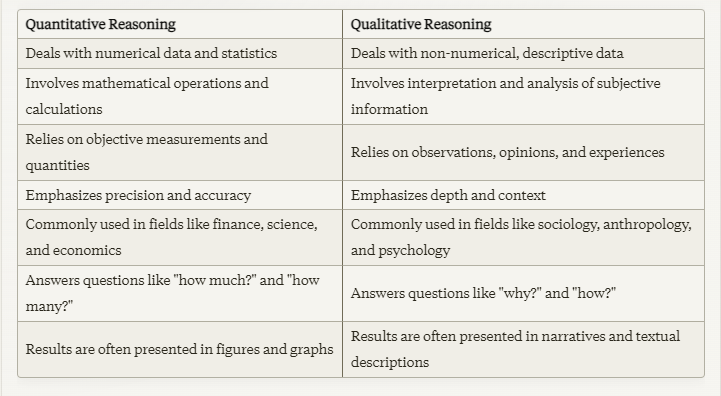
How Assignment Helpers Online Can Save You Time and Stress
Looking for online assignment helpers to save time and reduce stress? Learn how online homework help can make your academic life easier and more manageable.
Read MoreIn today's data-driven world, understanding and analyzing quantitative data is no longer a luxury; it's a need. Numerical data has become an essential component of our daily lives, controlling anything from financial choices to technological advances. Whether you're a college major, a high school student, a professional, or just someone looking to make intelligent decisions, acquiring quantitative skills is essential for success.
Developing a strong foundation in quantitative skills will provide you with vital tools for navigating difficult situations, making data-driven decisions, and unlocking new prospects for personal and professional development.
In this article, we'll look at the intriguing field of quantitative reasoning, which includes utilizing mathematical techniques to analyze and solve issues using numerical data. We'll dig into the art of quantitative thinking, revealing techniques for improving your comprehension of algebraic expressions, statistics, and data collection procedures.
Quantitative reasoning is the ability to think critically about numerical values and use reasoning skills to solve problems involving quantities or numeric entry questions. It empowers you to analyze data, recognize patterns, and draw conclusions based on quantitative information.
At its core, quantitative reasoning involves using quantitative principles and problem-solving techniques to approach a particular question or scenario involving numbers.
This skill set enables you to break down complex numerical challenges into manageable parts, apply appropriate mathematical operations, and interpret the results to make informed decisions.
Whether you're in school dealing with financial calculations, scientific measurements, or statistics homework, quantitative reasoning skills allow you to navigate through numerical information with confidence and clarity. By mastering this essential skill, you'll be equipped to tackle real-world challenges that demand a deep understanding of quantitative concepts and the ability to derive meaningful insights from numerical data.
A strong understanding of several foundational ideas is necessary to master quantitative reasoning. These fundamentals serve as the cornerstone for increasingly complex analysis methods and quantitative reasoning questions. Let's examine a few of the crucial components:
You must first comprehend what quantitative data is to apply quantitative reasoning. This category includes Numerical data that can be quantified, measured, or counted falls. Scores, prices, weights, and temperatures are a few examples. Quantitative reasoning measures involve Interacting with and analyzing these numerical values from different perspectives.
Quantitative reasoning heavily relies on numerical operations like addition, subtraction, multiplication, and division. Understanding these operations and their properties is crucial for manipulating and interpreting quantitative data.
In order to conduct meaningful quantitative reasoning, you must have accurate and trustworthy quantitative data. This is when data collection methods come into action. Surveys, experiments, and observations are used to collect data systematically and quantitatively.
Quantitative reasoning often involves analyzing and interpreting statistical data. Concepts like mean, median, mode, range, and probability distributions are fundamental tools for making sense of quantitative data.
Many quantitative reasoning tasks use algebraic expressions and equations. For college students, being acquainted with different college algebra concepts such as variables, constants, quadratic equations, and the capacity to solve for unknown values is vital for success.
Quantitative reasoning is more than just crunching numbers; it also necessitates logical thinking and problem-solving abilities. The capacity to break down difficult problems, find patterns, and draw conclusions from quantitative data is critical for getting the right answer.
Quantitative reasoning requires successfully expressing and deconstructing quantitative data. Translating numerical data into meaningful insights, generating visual representations (e.g., graphs, charts), and laying out results in a straightforward way are all skills that are required to understand quantitative information.
Quantitative reasoning requires a strategic approach integrating mathematical knowledge with critical thinking skills. Here are ten powerful strategies to elevate your quantitative reasoning abilities:
Quantitative thinking entails dealing with numerical data, mathematical concepts, and statistical interpretation. It relies on accurate measurements, calculations, and the interpretation of quantitative data. In contrast, qualitative reasoning focuses on subjective, non-numerical facts and is based on descriptive information, observations, and interpretations.
While quantitative reasoning concentrates on numerical data and statistical analysis, qualitative reasoning investigates the subjective experiences, viewpoints, and contextual elements that influence human behavior and phenomena. Both approaches are useful and, in many cases, complementary in a variety of academic and practical settings.

Being an essential skill, quantitative reasoning affects many facets of our lives, including our economic lives and scientific research. It requires the capacity to comprehend, analyze, and derive insights from quantitative data. Here are some examples demonstrating the significance and real-world applications of quantitative reasoning
Businesses rely predominantly on quantitative data analysis to make sound judgments. Market research frequently includes gathering quantitative data via questionnaires, sales records, and customer behavior tracking. Quantitative methods such as prediction models, statistical analysis, and data visualization are used to classify target consumers, identify trends, and assess the performance of marketing efforts.
To effectively manage your finances, you must use quantitative reasoning. From budgeting and tracking costs to calculating interest rates on loans or investments, you must interact with numerical data and make calculations. This includes activities like evaluating quantitative data from bank statements, comparing various payment plans, and anticipating future financial outcomes.
In the domain of sports, quantitative reasoning is critical for evaluating gaming tactics, assessing player performance, and forecasting outcomes. Coaches and analysts employ quantitative data, game logs, such as player statistics, and advanced analytics, to make informed decisions on team setup, training regimens, and tactical strategies.
Many scientific disciplines, including physics, biology, chemistry, and medicine, rely largely on quantitative research. Researchers collect quantitative data via observations, experiments, and modeling. They then use a variety of data analysis tools, such as statistical tests, mathematical modeling, and computational experiments, to interpret and draw conclusions.
While social sciences frequently deal with qualitative data, quantitative reasoning remains important. Professionals such as Economists, Sociologists, and psychiatrists commonly undertake surveys, experiments, and observational studies, which generate quantitative data that must be analyzed using statistical methods.
This enables them to detect patterns, test theories, and make important conclusions about human behavior and societal trends.
Environmental researchers use quantitative reasoning to examine and comprehend complex natural processes. They perform quantitative research and capture information about air and water quality, weather trends, population dynamics, and resource consumption. Data analysis techniques such as mathematical modeling, geographical analysis, and statistical inference are used to evaluate environmental impacts, forecast future scenarios, and advise policymakers.
In our rapidly evolving world, mastering quantitative reasoning has become an essential skill for personal and professional success. Fortunately, a wealth of resources and tools are available to help you expand your quantitative knowledge and enhance your numerical prowess.
One invaluable resource is the plethora of online courses and tutorials that cater to different learning styles and proficiency levels. These platforms offer a comprehensive exploration of quantitative reasoning, covering topics such as data analysis methods, quantitative research techniques, and qualitative methods. Many of these courses provide interactive exercises, question types that simulate real-world scenarios, and expert guidance to ensure you understand the concepts thoroughly.
Moreover, many of these online resources offer personalized feedback, allowing you to identify areas for improvement and track your progress over time. Whether you're a student seeking to strengthen your mathematical foundation or a professional aiming to sharpen your quantitative reasoning measure, these online courses provide a flexible and accessible path to mastery.
In addition to educational platforms, a growing number of quantitative reasoning software and apps are available to support your learning journey. These tools are designed to reinforce your understanding of quantitative data analysis, provide practice problems with the same answer choices, and offer immediate feedback on your performance.
Advanced analysis methods and statistical techniques are often integrated into these software solutions, enabling you to collect data, perform complex calculations, and visualize intricate patterns with ease.
From step-by-step problem-solving guides to interactive simulations, these tools ensure that you not only grasp the theoretical concepts but also develop the practical skills necessary to apply quantitative reasoning effectively.
Furthermore, many of these applications offer adaptive learning features that adjust the difficulty level and question types based on your strengths and weaknesses, ensuring a personalized and efficient learning experience. By leveraging these cutting-edge tools, you can continuously challenge yourself, identify areas for improvement, and ultimately achieve a deeper understanding of quantitative reasoning.
Whichever field you choose to explore, applying quantitative reasoning techniques holds the key to uncovering hidden patterns, optimizing processes, and making sound decisions. If you implement these strategies, you will go from being a mere data observer to a master analyzer, capable of pulling profound insight from the numerical world that surrounds us.
Quantitative reasoning is more than a skill; it is a way of life that allows us to overcome restrictions and change the boundaries of what is possible. Embracing it, helps one to be more equipped to face today's problems while developing tomorrow's innovations. In this period of exponential development and complexity, individuals who can use quantitative thinking will emerge as the builders of a brighter, more data-driven future.

Get affordable and top-notch help for your essays and homework services from our expert tutors. Ace your homework, boost your grades, and shine in online classes—all with just a click away!



Fast, secure, and handled by vetted experts.

Looking for online assignment helpers to save time and reduce stress? Learn how online homework help can make your academic life easier and more manageable.
Read More
Learn about the key components of an effective essay introduction and conclusion, including tips on how to engage readers and wrap up your ideas seamlessly.
Read More.jpg)
Struggling with homework? Discover 10 effective tips to complete your assignments quickly and efficiently. Read the article to boost your productivity!
Read More